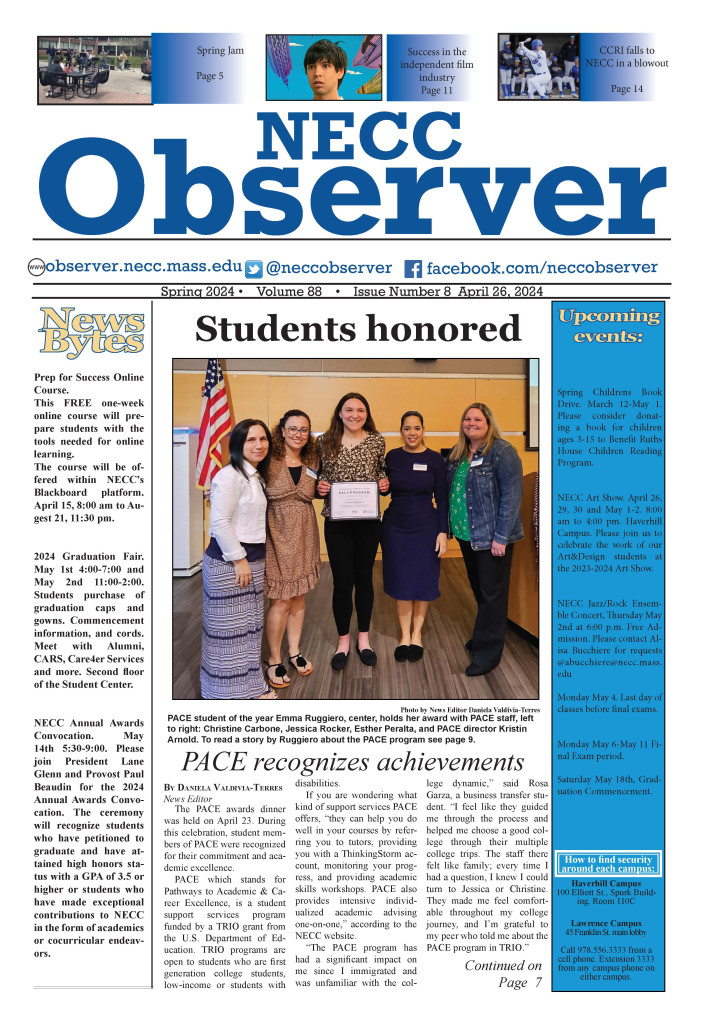By Eduardo Souza
Sept. 15 to Oct. 15 is National Hispanic Heritage Month, when people recognize the contributions Hispanic Americans have made to the U.S. and celebrate Hispanic culture and heritage.
There’s a considerable and diverse Hispanic population making their own contributions to the NECC student body.
This fall, 37 percent of all students attending NECC are Hispanic. The Lawrence campus alone has a Hispanic population of over 61 percent. Haverhill’s hispanic population is 29 percent.
This diverse group makes up a large portion of the NECC student body. Many are taking advantage of NECC’s resources to follow their career goals and continue their education.
Pablo Santana, an accounting major from the Dominican Republic, is currently in his second semester at NECC and hopes to continue his education after this.
“I think I’m going to transfer to UMASS Lowell… for their accounting program,” Santana said.
Others plan to use their education to start their own businesses.
Edwin Checo, a computer science major from the Dominican Republic, has a different plan. “I’ll probably work part-time until I build my own [computer programming] business,” Checo said.
Hispanic students transitioning into this environment often face many different problems that native speakers never have to worry about.
The difference in language, culture, values can be overwhelming to students trying to acclimate to the college environment. This transition can be extremely difficult, especially at the beginning.
Some students say that NECC can do a better job of helping non-native English speakers adapt into the college environment.
Paula Peña, a full-time NECC student majoring in Graphic Design, has lived in Massachusetts for about four years and had a hard time adapting to her new environment.
“I think they should offer better counseling services,” Peña said.
“I didn’t feel I had the proper guidance to help me take advantage of my time. I sort of had to figure things out by myself when I didn’t have the slightest idea how things work here,” said Peña.
NECC does offer mental health counseling services headed by Marcia Winters who can be reached at mwinters@necc.mass.edu as well as a Student Success Center which can be reached at ssc@necc.mass.edu.
According to the Eagle Tribune, “Northern Essex was one of only three schools in Massachusetts — and the only public campus — to receive a federal Title V grant for Hispanic Serving Institutions which helped fund a Student Success Center in Lawrence.”
This transition often impacts far beyond the school environment.
To some Hispanics and other immigrants, the difference in culture is so tremendous that it’s difficult to communicate with their peers in a way that they’ll be understood.
It’s not only students that have a difficult time with this transition process.
Professor Ligia Domenech teaches courses from World War II to World Civilization. Domenech moved from Puerto Rico three years ago, where she had taught at the University of Puerto Rico, and said that her transition was very difficult at times, but that the college facilitated the process.
“They [NECC] have a program here that’s like an induction program,” Domenech said. “Throughout the whole first semester, you have two hours a week of orientation … That helped a lot.”
Domenech said any school would benefit from having foreign professors. “It’s fantastic for the school to have foreign faculty,” Domenech said. “They bring a different perspective. A different style … I think it’s important that we have more of those models for the students.”
Domenech said she faces many hardships as a Hispanic professor at NECC. She constantly feels the pressure to do well so that NECC staff see Puerto Ricans and Hispanics in a positive light.
“When they see me, they see how Puerto Rican professors are. I’m representing all of us,” Domenech said. “And I don’t want them to have a negative image, because then they won’t contract others.”



